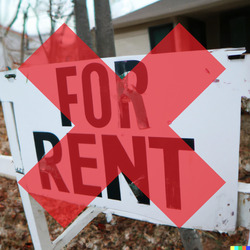 The Michigan Court of Appeals recently issued an opinion in Apache Hills Property Owners Association, Inc. v Sears Nichols Cottages, LLC (Docket No. 360554) which reconfirms how to interpret leasing and use restrictions.
The Michigan Court of Appeals recently issued an opinion in Apache Hills Property Owners Association, Inc. v Sears Nichols Cottages, LLC (Docket No. 360554) which reconfirms how to interpret leasing and use restrictions.
This case involved a dispute over the application of restrictive covenants to a short-term rental property in a subdivision, Apache Hills. Apache Hills Property Owners Association, the plaintiff, argued that the covenants restricted the use of each subdivision lot to single-family private residences and prohibit any business activity, except for a home office. The defendant purchased a subdivision lot and advertised it as a short-term rental property. The Association claimed short-term rentals were a business activity, which violated the subdivision’s restrictive covenants.
The subdivision restrictions specified as follows:
“6. USE.
A. Each lot in the Premises shall be used only for a single family private residence. Only one structure may be used as a dwelling on any such lot, except that additional living quarters, to be occupied only temporarily or seasonally, may be constructed over a garage…
No business of any sort, other than home office activities, shall be conducted from or on any lot within the Premises, and no signage advertising any such business shall be placed on a lot.
B. A lot owner may lease his/her property to a third party, but he/she has full liability for any breach by the tenant of these covenants.”
The Association sent cease-and-desist letters to the defendant, but the defendant continued to advertise and lease the property. The Association then filed suit against the defendant for breach of covenant, seeking injunctive and declaratory relief regarding the lot’s use. The defendant counterclaimed, arguing that the covenants allowed them to lease the property without restriction and sought a declaration that the lease did not constitute a commercial purpose.
Though the restrictive covenants permitted the leasing of lots to third parties, the Court of Appeals held that when the covenants are read as a whole, the intent was clear that leasing to third parties was permissible so long as the leases were long term and for single family purposes. In short, allowing leasing of lots to third parties does not circumvent the requirement that lots be used for single family purposes. The Court of Appeals also found that the defendants violated the restriction of use for “single family private residence”. The leases themselves, which allowed for up to 16 people to stay there and allowed for “friends,” were evidence that the lessors did not enforce the single family restriction.
The takeaway for associations with similar provisions in their governing documents is that it will be difficult for short-term lessors to get around provisions prohibiting “commercial use,” “business use,” and mandating “private occupancy,” “single family private residence,” and the like. However, to reduce the likelihood that your association faces litigation over these provisions, it is best to amend your documents to specifically prohibit or allow short-term renting, according to the community’s preference. Let us know if we may assist you.
This is the latest in a series of similar decisions from the Michigan Court of Appeals regarding similar restrictions. Read Sarah’s prior articles here and here.
